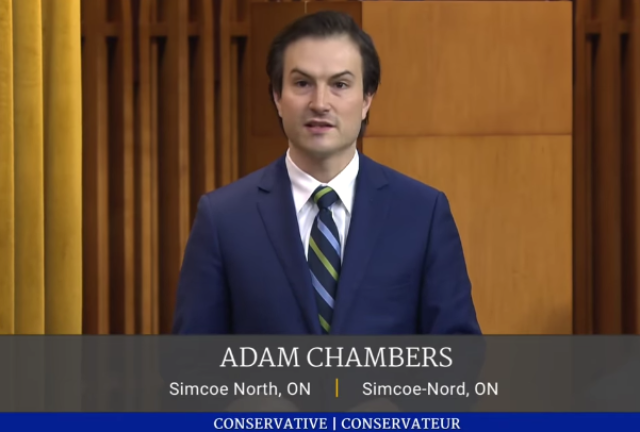While disappointed that his private members bill concerning money laundering went down to defeat, Simcoe North MP Adam Chambers was surprised how it occurred.
“The Liberals and NDP teamed up to defeat my anti-money laundering bill (Wednesday),” said Chambers, who is also the Conservative Party’s deputy shadow minister for finance.
“Interestingly – both Green members supported it and both independent members, I got two Liberal votes and a couple Liberal abstentions from people willing to risk punishment from their own whips.”
The final vote in the House of Commons was 149 in favour of the bill and 171 against moving it along to a third reading. Bloc Québécois MPs joined their Conservative counterparts in supporting the bill along with Ontario Liberal MPs Willowdale MP Ali Ehsassi and Nathaniel Erskine-Smith.
Chambers' bill sought to toughen Canada’s stance on white-collar criminals and so-called snow-washing, a term coined to refer to money laundering in Canada.
According to Chambers’ research into the issue, more than $100-billion is moved through Canada every year. He also started a petition to encourage the government to act quickly against money laundering.
"Global criminals are flocking to Canada to wash their dirty money," he said. "They know our laws are weak and money washed in Canada is easy to move around the world. If you look at white-collar crime, we convict very few. The rates of convictions and prosecutions are significantly low."
If it had been adopted, Chambers’ bill would have amended the Criminal Code to make it an offence to provide false information to a person or entity (such as banks and credit unions) listed in section 5 of the Proceeds of Crime (Money Laundering) and Terrorist Financing Act about the identity of a person or entity, including the corporate structure. Those who violate the law could have faced a prison term of up to 10 years and/or a fine of up to $1-million under the bill.
Prior to voting on the bill, Chambers said he was told by Liberal colleagues that their whip worked hard to ensure all of their members voted against it, “even though private member’s bills are typically not treated along a strict party line.”
Chambers said he’s disappointed that his colleagues across party lines didn’t come together to target money laundering, which he says is out of control in the country and needs to be addressed as quickly as possible by adding greater penalties and better safeguards to stop it from happening in the first place.
“Canada is a money-laundering paradise,” Chambers said, who also supports setting up a national inquiry to further study the matter.
“Canada is one of the primary destinations in the world for global criminals to clean their money."
Chambers said money laundering makes Canadian communities more dangerous and drives up real estate prices across the country while supporting criminal acts like drug trafficking, human trafficking and terrorist financing.
As for his first experience launching a private member’s bill, Chambers said it was an interesting process and he learned a lot.
“I take some comfort in knowing that it went down because of politics and not on its merits,” Chambers said.
“While unfortunate, it tells me the idea was a good one. I’ll keep looking for opportunities to advance the issue and others related to money laundering and financial crime.”
